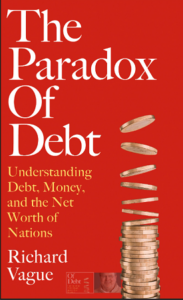Nov
2023
The Paradox of Debt – How Debt Creates Wealth and Increases Inequality
DIY Investor
1 November 2023
New Book Reveals Pioneering Financial Policies for Economic Prosperity Without Crisis

By Richard Vague
Why This Book Matters:
- The UK government is to run up the highest debt interest bill in the developed world in 2023* – The Paradox of Debt reveals how rising government debt is leading to both rising wealth and rising inequality, and that looking at government debt alone only gives half the picture.
- Reveals how private sector debt is increasingly vital to understanding the global economy – yet is often overlooked by economic analysis, which is focused on government debt (even though private sector debt is much bigger)
· The Paradox of Debt offers a compelling case and groundbreaking policy recommendations for new forms of debt monitoring, restructuring, and means to create greater socioeconomic equality.
· The book is underpinned by pioneering data analysis which sets out a new approach to analysing the economic data from the world’s six largest economies.
- Written by Richard Vague, Wall Street Journal Bestselling author, investor and entrepreneur. He has served as the Secretary of Banking and Securities for the Commonwealth of Pennsylvania and co-founded two US banks – First USA, which was sold to Bank One and Juniper, which was sold to Barclays.
- The Paradox of Debt is a culmination of a decade’s research, introducing a new school of thought – “debt economics” – and exploring how it can help us better manage the future of the global economy
When we talk about debt and its economic impact, we usually focus on “government debt”. However, this is only part of the picture: individuals, firms, and households owe trillions and understanding this rising private sector debt is increasingly vital to understanding the global economy.
 In this iconoclastic book, Richard Vague examines the assets, liabilities, and incomes of the world’s six largest economies as a whole, not just of their governments. The book shows that debt growth in excess of GDP growth is a feature of modern economic systems, not a bug—and thus ever-increasing leverage is built into the very structure of the economy. Vague reveals pioneering data that shows rising debt is the primary source of economic growth, new money creation, and wealth creation globally. Yet, paradoxically, it also brings heightened inequality and, when left unchecked, can lead to economic disaster.
In this iconoclastic book, Richard Vague examines the assets, liabilities, and incomes of the world’s six largest economies as a whole, not just of their governments. The book shows that debt growth in excess of GDP growth is a feature of modern economic systems, not a bug—and thus ever-increasing leverage is built into the very structure of the economy. Vague reveals pioneering data that shows rising debt is the primary source of economic growth, new money creation, and wealth creation globally. Yet, paradoxically, it also brings heightened inequality and, when left unchecked, can lead to economic disaster.
Based on a decade of research, the book sets out groundbreaking policies to manage the paradox.
Paradox of Debt explores how private debt is often misunderstood and overlooked, reveals why it is such a powerful economic force and introduces a pioneering new school of thought “debt economics”, which is vital to accurately forecasting economic trends, predicting financial crises and shaping economic policies that grow wealth and tackle inequality.
The Paradox of Debt – A New Path to Prosperity Without Crisis by Richard Vague is out now.
About The Author:Richard Vague is the author of The Paradox of Debt, which presents a new view of macroeconomics, The Case for a Debt Jubilee, a policy exploration of debt relief, An Illustrated Business History of the United States, the story of our nation’s business progress, A Brief History of Doom, a chronicle of major world financial crises, and The Next Economic Disaster, a book with a new approach for predicting and preventing financial crises.
Richard also serves as managing partner of Gabriel Investments, an early stage venture capital company.He previously served Secretary of Banking and Securities for the Commonwealth of Pennsylvania. as Chair of the Pennsylvania Housing Finance Agency, and as board trustee for Pennsylvania’s two largest pension funds, the Public School Employees’ Retirement System and the Pennsylvania State Employees’ Retirement System.He was also co-founder, Chairman and CEO of Energy Plus, an electricity and natural gas supply company, and co-founder and CEO of two consumer credit card banks, First USA and Juniper Bank.Richard currently serves on the University of Pennsylvania Board of Trustees and the Penn Medicine Board of Trustees, and on a number of business boards. He is chair of the University of Pennsylvania Press, and chair of the Innovation Advisory Board of the Abramson Cancer Center. He also serves on the Governing Board of the Institute for New Economic Thinking and the board of the Fund for the School District of Philadelphia. He is the founder of the economic data service Tychos (tychosgroup.org), which specializes in analyzing private debt trends, and the email newsletter service Delanceyplace.com, which focuses on non-fiction literature.
Leave a Reply
You must be logged in to post a comment.